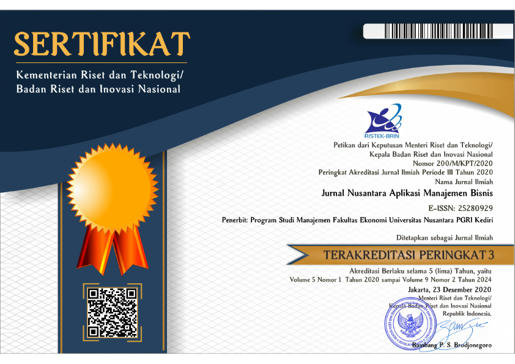Pengaruh Gender Pada Kinerja UMKM: Sebuah Literatur Review
DOI:
https://doi.org/10.29407/nusamba.v7i2.16837Keywords:
Pengaruh Gender, Kinerja UMKM, Literatur ReviewAbstract
The role of women in improving the economy has often been echoed in relation to their work in doing business independently. However, so far, micro, small and medium enterprises managed by women have not been properly developed so that they are able to grow and develop and have optimal competitiveness. Is it true that businesses run by women are less profitable than businesses run by men? This study uses a systematic literature review method by analyzing the results of research in various places related to this, including factors that can be observed so that businesses managed by women can show maximum performance. The results of this study are expected to provide information related to improving performance, especially for women.
Downloads
References
world bank, “population total,” SAMARINDA, Oct. 2021.
Badan Pusat Statistik, “Jumlah Penduduk Hasil SP2020 menurut Wilayah dan Jenis Kelamin (Orang), 2020,” Jakarta, Dec. 2021.
L. Cabeza-García, E. B. Del Brio, and M. L. Oscanoa-Victorio, “Gender factors and inclusive economic growth: The silent revolution,” Sustain., vol. 10, no. 1, 2018, doi: 10.3390/su10010121.
F. Farooq, Z. Yusop, I. S. Chaudhry, and R. Iram, “Assessing the impacts of globalization and gender parity on economic growth: empirical evidence from OIC countries,” Environ. Sci. Pollut. Res., vol. 27, no. 7, 2020, doi: 10.1007/s11356-019-07289-y.
V. Kumar, “Gender Role in Performance of Small Scale Industry, Factors Affecting Women Entreprnereurs Growth in Delhi, Case Study,” IOSR J. Econ. Financ. Ver. III, vol. 6, no. 4, 2015.
K. Chaudhuri, S. Sasidharan, and R. S. N. Raj, “Gender, small firm ownership, and credit access: some insights from India,” Small Bus. Econ., vol. 54, no. 4, 2020, doi: 10.1007/s11187-018-0124-3.
M. B. Calás and L. Smircich, “Using the F Word: Feminist Theories and the Social Consequences of Organizational Research.,” Acad. Manag. Proc., vol. 1989, no. 1, 1989, doi: 10.5465/ambpp.1989.4981251.
I. Verheul, R. Thurik, I. Grilo, and P. Van der Zwan, “Explaining preferences and actual involvement in self-employment: Gender and the entrepreneurial personality,” J. Econ. Psychol., vol. 33, no. 2, 2012, doi: 10.1016/j.joep.2011.02.009.
S. Gottschalk and M. Niefert, “Gender differences in business success of German start-up firms,” Int. J. Entrep. Small Bus., vol. 18, no. 1, 2013, doi: 10.1504/IJESB.2013.050750.
E. M. Fischer, A. R. Reuber, and L. S. Dyke, “A theoretical overview and extension of research on sex, gender, and entrepreneurship,” J. Bus. Ventur., vol. 8, no. 2, 1993, doi: 10.1016/0883-9026(93)90017-Y.
S. Radipere and S. Dhliwayo, “The role of gender and education on small business performance in the South African small enterprise sector,” Mediterr. J. Soc. Sci., vol. 5, no. 9, 2014, doi: 10.5901/mjss.2014.v5n9p104.
A. L. Kalleberg and K. T. Leicht, “GENDER AND ORGANIZATIONAL PERFORMANCE: DETERMINANTS OF SMALL BUSINESS SURVIVAL AND SUCCESS.,” Acad. Manag. J., vol. 34, no. 1, 1991, doi: 10.2307/256305.
A. Basyith and M. Idris, “The Gender Effect on Small Business Enterprises’ Firm Performance: Evidence from Indonesia,” Indian J. Econ. Bus., vol. 13, no. 1, 2014.
H. Shava and E. C. Rungani, “Influence of gender on SME performance in emerging economies,” Acta Commer., vol. 16, no. 1, 2016, doi: 10.4102/ac.v16i1.408.
P. Christopher Weber and L. Geneste, “Exploring gender-related perceptions of SME success,” Int. J. Gend. Entrep., vol. 6, no. 1, pp. 15–27, Mar. 2014, doi: 10.1108/IJGE-04-2013-0038.
T. Q. Tran, “Identifying female leadership and performance in small and medium-sized enterprises in a transition economy: The case study of Vietnam,” Asian Econ. Financ. Rev., vol. 10, no. 2, 2020, doi: 10.18488/journal.aefr.2020.102.132.145.
T. Belete, “Performance of Micro and Small Enterprises with a Special Reference to Female Entrepreneurs in North Gondar, Ethiopia,” Splint Int. J. Prof., vol. 3, no. 7, 2016.
J. Ali and S. Shabir, “Does gender make a difference in business performance?,” Gend. Manag. An Int. J., vol. 32, no. 3, pp. 218–233, May 2017, doi: 10.1108/GM-09-2016-0159.
“Creativity and Entrepreneurship: The role of Gender and Personality,” Int. J. Bus. Econ. Sci. Appl. Res., vol. 11, no. 1, 2018, doi: 10.25103/ijbesar.111.01.
S. Sudjatno and R. Safitri, “THE INFLUENCE OF ENTREPRENEUR ORIENTATION AND GOVERNMENT ROLE TOWARD BATIK SMES PERFORMANCE IN THE PACITAN,” Manag. Econ. J., 2018, doi: 10.18860/mec-j.v1i2.4918.
B. Headd, “Redefining Business Success: Distinguishing between Closure and Failure,” Small Business Economics, vol. 21, no. 1. 2003, doi: 10.1023/A:1024433630958.
M. Jaiswal, “Gender differences and new venture performance,” New Engl. J. Entrep., vol. 23, no. 1, pp. 41–61, Jun. 2020, doi: 10.1108/neje-08-2019-0038.
I. El Aissi, H. Gharbi, and S. Youssef, “A gender analysis of the relationship between entrepreneurial orientation and performance: the case of Tunisian women entrepreneurs,” Cult. Soc., vol. 9, no. 1, 2018, doi: 10.7220/2335-8777.9.1.5.
B. N. Neneh, J. H. van Zyl, and M. A. van Noordwyk, “Gender Differences in Entrepreneurial Orientation and Performance: Evidence From South Africa,” Conf. Pap. Submitt. South. African Inst. Manag. Sci., pp. 4–7, 2016, [Online]. Available: https://www.up.ac.za/media/shared/643/ZP_Files/2016/Papers/sme7_full.zp97894.pdf.
I. Gorzeń-mitka, “Risk Management in Small and Medium-Sized Enterprises : a Gender-Sensitive Approach,” Probl. Manag. 21st CENTURY, vol. 10, no. 2, 2015.
M. Reza, D. T. H. Manurung, V. V. Kolmakov, and A. S. Alshebami, “Impact of education and training on performance of women entrepreneurs in Indonesia: Moderating effect of personal characteristics,” Manag. Sci. Lett., vol. 10, no. 16, 2020, doi: 10.5267/j.msl.2020.7.018.
C. Constantinidis, T. Lebègue, M. El Abboubi, and N. Salman, “How families shape women’s entrepreneurial success in Morocco: an intersectional study,” Int. J. Entrep. Behav. Res., vol. 25, no. 8, 2019, doi: 10.1108/IJEBR-12-2017-0501.
Downloads
Published
Issue
Section
License
Authors who publish with this journal agree to the following terms:
- Copyright on any article is retained by the author(s).
- The author grants the journal, the right of first publication with the work simultaneously licensed under a Creative Commons Attribution License that allows others to share the work with an acknowledgment of the work’s authorship and initial publication in this journal.
- Authors are able to enter into separate, additional contractual arrangements for the non-exclusive distribution of the journal’s published version of the work (e.g., post it to an institutional repository or publish it in a book), with an acknowledgment of its initial publication in this journal.
- Authors are permitted and encouraged to post their work online (e.g., in institutional repositories or on their website) prior to and during the submission process, as it can lead to productive exchanges, as well as earlier and greater citation of published work.
- The article and any associated published material is distributed under the Creative Commons Attribution-ShareAlike 4.0 International License












